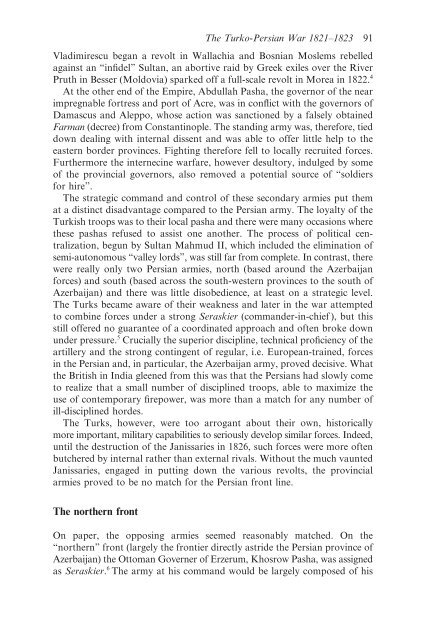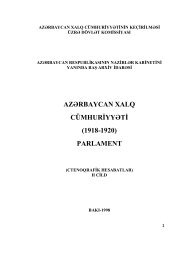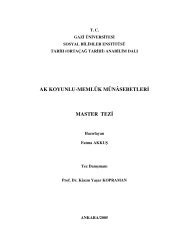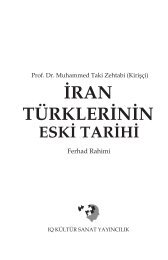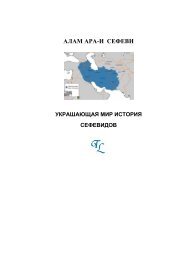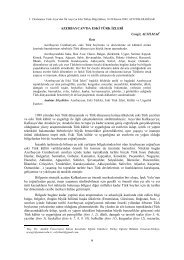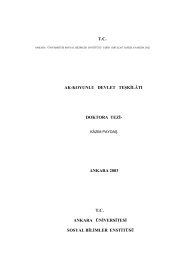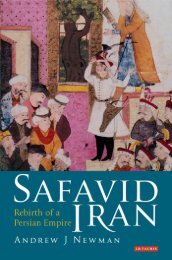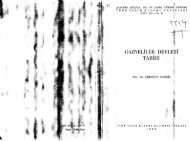War and Peace in Qajar Persia: Implications Past and ... - Oguzlar.az
War and Peace in Qajar Persia: Implications Past and ... - Oguzlar.az
War and Peace in Qajar Persia: Implications Past and ... - Oguzlar.az
- No tags were found...
You also want an ePaper? Increase the reach of your titles
YUMPU automatically turns print PDFs into web optimized ePapers that Google loves.
The Turko-<strong>Persia</strong>n <strong>War</strong> 1821–1823 91Vladimirescu began a revolt <strong>in</strong> Wallachia <strong>and</strong> Bosnian Moslems rebelledaga<strong>in</strong>st an “<strong>in</strong>fidel” Sultan, an abortive raid by Greek exiles over the RiverPruth <strong>in</strong> Besser (Moldovia) sparked off a full-scale revolt <strong>in</strong> Morea <strong>in</strong> 1822. 4At the other end of the Empire, Abdullah Pasha, the governor of the nearimpregnable fortress <strong>and</strong> port of Acre, was <strong>in</strong> conflict with the governors ofDamascus <strong>and</strong> Aleppo, whose action was sanctioned by a falsely obta<strong>in</strong>edFarman (decree) from Constant<strong>in</strong>ople. The st<strong>and</strong><strong>in</strong>g army was, therefore, tieddown deal<strong>in</strong>g with <strong>in</strong>ternal dissent <strong>and</strong> was able to offer little help to theeastern border prov<strong>in</strong>ces. Fight<strong>in</strong>g therefore fell to locally recruited forces.Furthermore the <strong>in</strong>ternec<strong>in</strong>e warfare, however desultory, <strong>in</strong>dulged by someof the prov<strong>in</strong>cial governors, also removed a potential source of “soldiersfor hire”.The strategic comm<strong>and</strong> <strong>and</strong> control of these secondary armies put themat a dist<strong>in</strong>ct disadvantage compared to the <strong>Persia</strong>n army. The loyalty of theTurkish troops was to their local pasha <strong>and</strong> there were many occasions wherethese pashas refused to assist one another. The process of political centralization,begun by Sultan Mahmud II, which <strong>in</strong>cluded the elim<strong>in</strong>ation ofsemi-autonomous “valley lords”, was still far from complete. In contrast, therewere really only two <strong>Persia</strong>n armies, north (based around the Azerbaijanforces) <strong>and</strong> south (based across the south-western prov<strong>in</strong>ces to the south ofAzerbaijan) <strong>and</strong> there was little disobedience, at least on a strategic level.The Turks became aware of their weakness <strong>and</strong> later <strong>in</strong> the war attemptedto comb<strong>in</strong>e forces under a strong Seraskier (comm<strong>and</strong>er-<strong>in</strong>-chief ), but thisstill offered no guarantee of a coord<strong>in</strong>ated approach <strong>and</strong> often broke downunder pressure. 5 Crucially the superior discipl<strong>in</strong>e, technical proficiency of theartillery <strong>and</strong> the strong cont<strong>in</strong>gent of regular, i.e. European-tra<strong>in</strong>ed, forces<strong>in</strong> the <strong>Persia</strong>n <strong>and</strong>, <strong>in</strong> particular, the Azerbaijan army, proved decisive. Whatthe British <strong>in</strong> India gleened from this was that the <strong>Persia</strong>ns had slowly cometo realize that a small number of discipl<strong>in</strong>ed troops, able to maximize theuse of contemporary firepower, was more than a match for any number ofill-discipl<strong>in</strong>ed hordes.The Turks, however, were too arrogant about their own, historicallymore important, military capabilities to seriously develop similar forces. Indeed,until the destruction of the Janissaries <strong>in</strong> 1826, such forces were more oftenbutchered by <strong>in</strong>ternal rather than external rivals. Without the much vauntedJanissaries, engaged <strong>in</strong> putt<strong>in</strong>g down the various revolts, the prov<strong>in</strong>cialarmies proved to be no match for the <strong>Persia</strong>n front l<strong>in</strong>e.The northern frontOn paper, the oppos<strong>in</strong>g armies seemed reasonably matched. On the“northern” front (largely the frontier directly astride the <strong>Persia</strong>n prov<strong>in</strong>ce ofAzerbaijan) the Ottoman Governer of Erzerum, Khosrow Pasha, was assignedas Seraskier. 6 The army at his comm<strong>and</strong> would be largely composed of his


